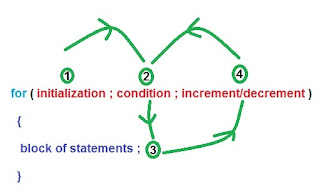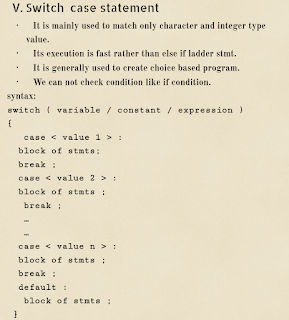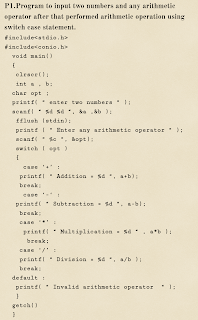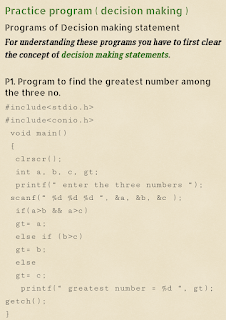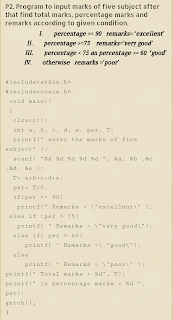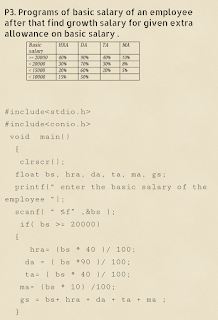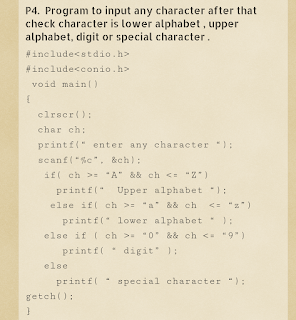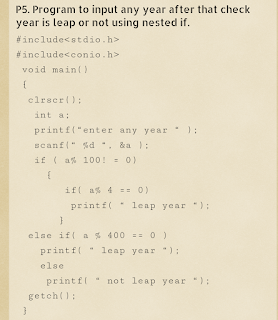This statement is used to repeat a block of statements multiple times according to the specify condition.
Any loop consists of three parts :-
I.
Initialization part
II.
condition part
III.
increment/ decrement part
⇒Types of Looping statements :-
There are three loops in C and C++
I.
for loop
II.
while loop
III.
do – while loop ( exit control loop )
➤For Loop :-
- In this loop we can specify initialization part , condition and increment / decrement part at a time .
- It is a type of entry control loop because condition is checked first.
- At first initialization part is executed.
- After that condition is checked and then block of stmts is executed.
- And then after increment/ decrement is executed and again condition is checked , and the loop continued.
Syntax :-
for( initialization
; condition ; increment / decrement )
{
block of stmts;
}
example 1:-
for ( i=1 ; i <= 100 ; i++ )
{
printf( “ %d \n “, i );
}
Example 2:-
i = 1;
for( ; i
<= 100 ; )
{
printf( “ %d \n “
, i );
i++;
}
⏩Standard form of for loop
I.
Infinity for loop
for ( ;
; )
{
printf( “ Saurav “ ) ;
}
II.
for ( i=1 , j = 1 , k = 1 ; condition ; i++, j++
,k++ )
{
block of stmts ;
}
III.
for (
; condition ; )
{
block of stmts ;
}
➤While Loop :-
- In this loop all the three parts are specified separately.
- It is a type of entry control loop because condition is checked first .
- At first initialization part is executed.
- After that condition is checked and then block of stmts is executed.
- And then after increment/ decrement is executed and again condition is checked , and the loop continued.
Syntax :-
initialization
while( condition )
{
block of stmts ;
increment/
decrement;
}
 |
| syntax of while loop |
Example:-
i=1;
while ( I <= 100
)
{
printf( “ %d\n “,
&i);
i++;
}
➤Do – While loop :-
- In this loop all the three parts are specified separately.
- It is a type of exit control loop because block of stmts is executed before the condition .
- At first block of stmts part is executed.
- After that increment/ decrement part is executed .
- Then after condition is checked , if it is true then the block of stmts is executed again and the loops continued.
Syntax :-
initialization;
do
{
block of stmts ;
increment /
decrement ;
}
while ( condition );
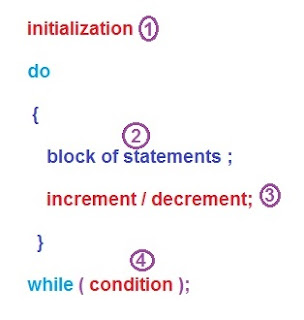 |
| syntax of do-while loop |
Example :-
i=1;
do
{
printf( “ %d \n “,
&I );
i++;
}
while ( i <= 100
);
Let us know how different these loops are in programming.
P1. Program to print the series of natural no. upto 100 by for loop.
#include<stdio.h>
#include<conio.h>
void main()
{
clrscr();
int i;
printf( “ The
series of natural no. upto 100 are \n “);
for( i =1 ; i <=
100 ; i ++ )
printf( “ %d \n “,
i );
getch();
P2. Program to print the series of natural no. upto 100 by while loop.
#include<stdio.h>
#include<conio.h>
void main()
{
clrscr();
int i;
printf( “The series
of natural no. upto 100 are \n “);
i=1;
while( i <= 100
)
{
printf( “ %d\n “,
i );
i++;
}
getch ();
P3. Program to print the series of natural no. upto 100 by do - while loop.
#include<stdio.h>
#include<conio.h>
void main()
{
clrscr();
int i;
printf( “The series
of natural no. upto 100 are \n “);
i=1;
do
{
printf( “ %d\n “,
i );
i++;
}
while( i <= 100 );
getch ();
}
We practice more programs of looping statement further.

